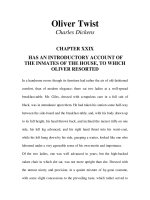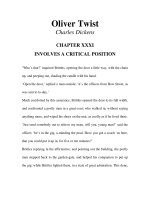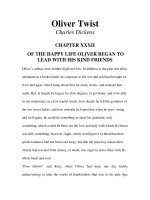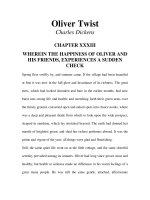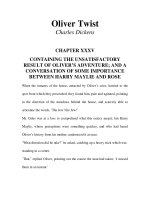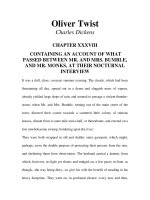Tài liệu LUYỆN ĐỌC TIẾNG ANH QUA TÁC PHẨM VĂN HỌC-SHORT STORY BY O’HENRY -A Little Local Colour docx
Bạn đang xem bản rút gọn của tài liệu. Xem và tải ngay bản đầy đủ của tài liệu tại đây (24.67 KB, 9 trang )
SHORT STORY BY O’HENRY
A Little Local Colour
I mentioned to Rivington that I was in search of characteristic New York
scenes and incidents -- some- thing typical, I told him, without necessarily
having to spell the first syllable with an "i."
"Oh, for your writing business," said Rivington; "you couldn't have applied
to a better shop. What I don't know about little old New York wouldn't make
a sonnet to a sunbonnet. I'll put you right in the middle of so much local
colour that you won't know whether you are a magazine cover or in the
erysipelas ward. When do you want to begin?"
Rivington is a young-man-about-town and a New Yorker by birth,
preference and incommutability.
I told him that I would be glad to accept his escort and guardianship so that I
might take notes of Manhattan's grand, gloomy and peculiar idiosyncrasies,
and that the time of so doing would be at his own convenience.
"We'll begin this very evening," said Rivington, him- self interested, like a
good fellow. "Dine with me at seven, and then I'll steer 'you up against
metropolitan phases so thick you'll have to have a kinetoscope to record
'em."
So I dined with Rivington pleasantly at his club, in Forty-eleventh street, and
then we set forth in pursuit of the elusive tincture of affairs.
As we came out of the club there stood two men on the sidewalk near the
steps in earnest conversation.
"And by what process of ratiocination," said one of them, "do you arrive at
the conclusion that the division of society into producing and non-possessing
classes predicates failure when compared with competitive systems that are
monopolizing in tendency and result inimically to industrial evolution?"
"Oh, come off your perch!" said the other man, who wore glasses. "Your
premises won't come out in the wash. You wind-jammers who apply bandy-
legged theories to concrete categorical syllogisms send logical conclusions
skallybootin' into the infinitesimal ragbag. You can't pull my leg with an old
sophism with whiskers on it. You quote Marx and Hyndman and Kautsky -
what are they? -- shines! Tolstoi? -- his garret is full of rats. I put it to you
over the home-plate that the idea of a cooperative commonwealth and an
abolishment of competitive systems simply takes the rag off the bush and
gives me hyperesthesia of the roopteetoop! The skoo- kum house for yours!
I stopped a few yards away and took out my little notebook.
"Oh, come ahead," said Rivington, somewhat ner- vously; "you don't want to
listen to that."
"Why man," I whispered, "this is just what I do want to hear. These slang
types are among your city's most distinguishing features. Is this the Bowery
variety? I really must hear more of it."
"If I follow you," said the man who had spoken flrst, "you do not believe it
possible to reorganize society on the basis of common interest?"
"Shinny on your own side!" said the man with glasses. "You never heard any
such music from my foghorn. What I said was that I did not believe it
practicable just now. The guys with wads are not in the frame of mind to
slack up on the mazuma, and the man with the portable tin banqueting
canister isn't exactly ready to join the Bible class. You can bet your
variegated socks that the situation is all spifflicated up from the Battery to
breakfast! What the country needs is for some bully old bloke like Cobden
or some wise guy like old Ben Frank- lin to sashay up to the front and biff
the nigger's head with the baseball. Do you catch my smoke? What?"
Rivington pulled me by the arm impatiently.
"Please come on," he said. "Let's go see something. This isn't what you
want."
"Indeed, it is," I said resisting. "This tough talk is the very stuff that counts.
There is a picturesqueness about the speech of the lower order of people that
is quite unique. Did you say that this is the Bowery variety of slang?"
"Oh, well," said Rivington, giving it up, "I'll tell you straight. That's one of
our college professors talking. He ran down for a day or two at the club. It's
a sort of fad with him lately to use slang in his conversation. He thinks it
improves language. The man he is talking to is one of New York's famous
social economists. Now will you come on. You can't use that, you know."
"No," I agreed; "I can't use that. Would you call that typical of New York?"
"Of course not," said Rivington, with a sigh of relief. "I'm glad you see the
difference. But if you want to hear the real old tough Bowery slang I'll take
you down where you'll get your fill of it."
"I would like it," I said; "that is, if it's the real thing. I've often read it in
books, but I never heard it. Do you think it will be dangerous to go
unprotected among those characters ?
"Oh, no," said Rivington; "not at this time of night. To tell the truth, I
haven't been along the Bowery in a long time, but I know it as well as I do
Broadway. We'll look up some of the typical Bowery boys and get them to
talk. It'll be worth your while. They talk a peculiar dialect that you won't
hear any-where else on earth."
Rivington and I went east in a Forty-second street car and then south on the
Third avenue line.
At Houston street we got off and walked.
"We are now on the famous Bowery," said Rivington; "the Bowery
celebrated in song and story."
We passed block after block of "gents'" furnishing stores -- the windows full
of shirts with prices attached and cuffs inside. In other windows were
neckties and no shirts. People walked up and down the sidewalks.
"In some ways," said I, "this reminds me of Koko- mono, Ind., during the
peach-crating season."
Rivington was nettled.
"Step into one of these saloons or vaudeville shows," said he, "with a large
roll of money, and see how quickly the Bowery will sustain its reputation."
"You make impossible conditions," said I, coldly.
By and by Rivington stopped and said we were in the heart of the Bowery.
There was a policeman on the corner whom Rivington knew.
"Hallo, Donahue!" said my guide. "How goes it? My friend and I are down
this way looking up a bit of local colour. He's anxious to meet one of the
Bowery types. Can't you put us on to something genuine in that line --
something that's got the colour, you know?"
Policeman Donahue turned himself about ponder- ously, his florid face full
of good-nature. He pointed with his club down the street.
"Sure!" he said huskily. "Here comes a lad now that was born on the Bowery

